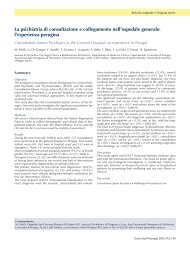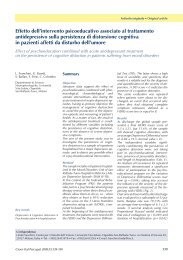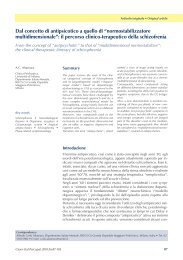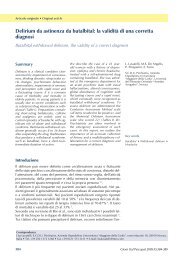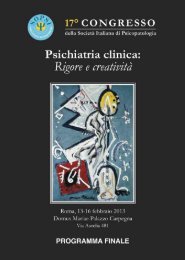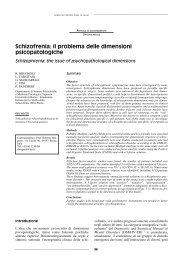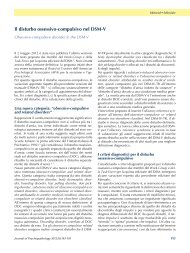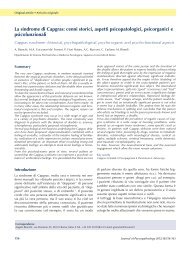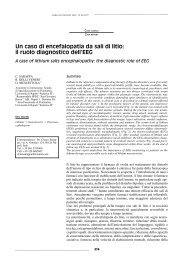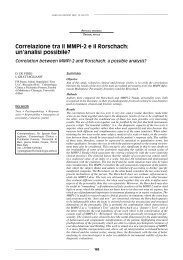XI Congresso della Società Italiana di Psicopatologia Psichiatria ...
XI Congresso della Società Italiana di Psicopatologia Psichiatria ...
XI Congresso della Società Italiana di Psicopatologia Psichiatria ...
Create successful ePaper yourself
Turn your PDF publications into a flip-book with our unique Google optimized e-Paper software.
The Serotonin Hypothesis of Obsessive<br />
Compulsive Disorder: an Update<br />
J. Zohar<br />
Sheba Me<strong>di</strong>cal Center, Division of Psychiatry, Tel-<br />
Hashomer, Israel<br />
OCD is unique with regard to treatment response. As opposed<br />
to other psychiatric <strong>di</strong>sorders such as depression, panic<br />
<strong>di</strong>sorder, post traumatic stress <strong>di</strong>sorder, ecc., in which noradrenergic<br />
and serotonergic me<strong>di</strong>cations were found to be<br />
effective, OCD seems to respond preferentially to serotonergic<br />
me<strong>di</strong>cations 1 2 .<br />
In a double-blind, placebo controlled study an exacerbation<br />
of obsessive compulsive symptoms was reported following<br />
oral administration of the serotonin agonist<br />
methylchlorophenylpiperizine (mCPP) 3 . These fin<strong>di</strong>ngs,<br />
that were replicated in another four stu<strong>di</strong>es 2 , were interpreted<br />
as in<strong>di</strong>cating behavioral hypersensitivity of the<br />
serotonergic receptors in OCD patients. It is important to<br />
note that other anxiogenic challenges, such as lactate, carbon<br />
<strong>di</strong>oxide, yohimbine and cholicystokonine receptor agonists<br />
were not associated with an exacerbation of OC<br />
symptoms. Taking together these positive and negative<br />
fin<strong>di</strong>ngs suggests that OCD patients are not sensitive to all<br />
anxiogenic challenges, but only to 5HT challenges.<br />
By analyzing the behavioral response to other pharmacological<br />
challenges (such as MK-212 and isapirone), a possible<br />
role of the 5HT 1D receptor, densely located in the basal<br />
ganglia, in OCD has been posed 4 .<br />
Preliminary data with the 5HT 1D agonist sumatriptan supported<br />
this hypothesis. Case reports, in which prolonged administration<br />
of sumatriptan was associated with therapeutic<br />
effects, provide ad<strong>di</strong>tional support for the potential role of<br />
5HT 1D in obsessive compulsive symptoms 5 6 .<br />
Recently published genetic data in<strong>di</strong>cating polymorphism of<br />
5HT 1Dβ in OCD patients 7 replicate the already existing data<br />
on the role of 5HT 1Dβ in OCD 2 . Dimensionally speaking,<br />
5HT 1D might actually be implicated in repetitive behavior 8 .<br />
Newer compounds such as zolmitriptan, which is also a<br />
5HT 1D agonist, and is safe for human use (it has, like sumatriptan,<br />
an approval as anti-migraine me<strong>di</strong>cation) might be<br />
used in a pharmacological challenge to further elucidate the<br />
potential role of 5HT 1D in OCD.<br />
The real challenge, however, is to link the pharmacological<br />
challenge in sophisticated behavioral setting along with the<br />
genetic fin<strong>di</strong>ngs and brain imaging reactivity (as an ad<strong>di</strong>tional<br />
marker) in order to harness the potential of 5HT 1D in OCD.<br />
References<br />
1 Zohar J, Insel TR. Obsessive-compulsive <strong>di</strong>sorders; psychobiological<br />
approaches to <strong>di</strong>agnosis, treatment and pathophysiology.<br />
Biol Psychiat 1987;22:667-87.<br />
21<br />
SIMPOSI TEMATICI<br />
22 FEBBRAIO 2005 - ORE 14.15-15.45<br />
SALA CAVALIERI 2<br />
S2 - Lo stato dell’arte nella terapia del Disturbo<br />
Ossessivo Compulsivo<br />
MODERATORI<br />
L. Bello<strong>di</strong>, J. Zohar<br />
2 Zohar J, Kennedy JL, Hollander E, Koran L. Serotonin-1D hypothesis<br />
of obsessive-copmpulsive <strong>di</strong>sorder: an update. 2004.<br />
3 Zohar J, Mueller EA, Insel TR, Zohar-Kadouch RC, Murphy<br />
DL. Serotonergic responsivity in obsessive-compulsive <strong>di</strong>sorder:<br />
comparison of patients and healthy controls. Arch Gen Psychiatry<br />
1987;44:946-51.<br />
4 Zohar J. Is 5HT1D involved in obsessive compulsive <strong>di</strong>sorder? IX<br />
ECNP Congress 1996, p. 4-54 (abstract S.26.02).<br />
5 Stern L, Zohar J, Cohen R, Sasson Y. Treatment of severe,<br />
drug resistant obsessive-compulsive <strong>di</strong>sorder with the 5HT1D agonist sumatriptan. Eur Neuropsychopharmacol 1998;8:325-<br />
8.<br />
6 Pathak S, Cottingham EM, McConville. The use of sumatriptan<br />
in the treatment of obsessive compulsive <strong>di</strong>sorder in an<br />
adolescent. J Child Adolesc Psychopharmacol 2003;13(Suppl<br />
1):S93-4.<br />
7 Mundo E, Richter MA, Zai G, McBride J, Macciar<strong>di</strong> F,<br />
Kennedy JL. 5HT1D receptor gene implicated in the pathogenesis<br />
of obsessive compulsive <strong>di</strong>sorder: further evidence<br />
from a family-based association study. Molecul Psychiatry<br />
2002;7:805-9.<br />
8 Hollander E, Pallanti S. 5HT1D function and repetitive behaviors.<br />
Am Psychiatry 2001;158:972-3.<br />
The role of dopamine in Obsessive-<br />
Compulsive Disorder: an update<br />
D. Denys<br />
The Rudolf Magnus Institute of Neuroscience, Department<br />
of Psychiatry, University Me<strong>di</strong>cal Center, Utrecht, The<br />
Netherlands<br />
Obsessive compulsive <strong>di</strong>sorder (OCD) is a chronic psychiatric<br />
<strong>di</strong>sorder characterized by recurrent persistent<br />
thoughts (obsessions) and/or repetitive compulsory behaviors<br />
(compulsions).<br />
Over the past two decades, it has been suggested that OCD<br />
might be related to the functioning of brain serotonin systems,<br />
mainly because of the anti-obsessional efficacy of<br />
selective serotonin inhibitors (SRIs). In recent years, there<br />
is growing evidence that the dopamine system may be involved<br />
in OCD as well. In this presentation, the preclinical<br />
and clinical evidence supporting the role for dopamine in<br />
the pathophysiology of OCD will be reviewed.<br />
Evidence for the involvement of dopamine in OCD may be<br />
obtained from animal models, measurements of dopamine<br />
and metabolite concentrations, pharmacochallenge and<br />
pharmacotherapeutic stu<strong>di</strong>es, and neuro-imaging, and genetic<br />
association stu<strong>di</strong>es.<br />
The role of dopamine will be highlighted at the background<br />
of current OCD para<strong>di</strong>gms.



